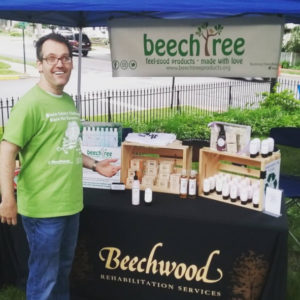Woods Services resident Patrick feels blessed to be where he’s at in his career. Woods has recognized and fostered his skills.
“I work with people who can’t talk, so I want to learn sign language,” Patrick said. “I want to learn where they’re coming from.”
Woods’ residents in the workforce are diverse in their skills and needs. So, Woods has a range of employment opportunities.
Vocational training begins at the Woods Schools. When a student turns 14, the schools provide life skills and hands-on job training. In school, students can learn skills in housekeeping, retail, technology, beauty, and landscaping that can prepare them for competitive, entry-level work. This education can also occur in the community with the assistance of a job coach. Marshalls, Giant, and Sesame Place are just a few examples of where students can get their vocational starts locally. Ultimately, their education is guided by their interests and abilities.
Once a student reaches 21, they can find themselves in three different settings:
- Holland Enrichment Center offers non-working adults day programming.
- The Woods Enterprises, or TWE, offers newly graduated students a supervised work center and supervised group work in community settings.
- Woods’ Social Enterprises, The Yellow Daffodil, Woods Wear, and Common Grounds Cafe, offer the most independent work setting at Woods where new grads can work up to full-time.
“We want clients to be in the least restrictive environment and meet the level of their abilities,” said Danica Lynn, Director of the Social Enterprises.
Let’s take a closer look at TWE.
The work is varied, though one common thread binds the work done: adaptability. Adaptability is a critical element that makes TWE and those who work there succeed. These positions are not paid hourly nor by salary; they are paid by pieces produced. This allows workers to step aside as often as they need. This format has drawn its critics.
“People have tried to shut TWE down,” TWE employee Jason S. said.
Well-intentioned pushes for workplace integration and wage reforms are often the reasons critics cite for wanting to shut down workplaces such as TWE. Woods believes TWE exists to foster an inclusive, understanding environment equipped to support workers whose needs are varied – something that other business models cannot provide.
“I like all the work I do here,” TWE employee Sarah said.
While working at TWE, the employees can also take their talents to different “enclaves,” jobs outside of TWE where they work in small groups. For Sarah, you can also find her caring for the animals at Woods.
“One day at a time, my dear sir,” Jason A. said. “I love my work.”
Jason A. is also employed at TWE and works within different enclaves. For him, as well as many others, community work takes him to Habitat for Humanity ReStores. Here, you can find him sweeping.
Patrick similarly worked throughout the community, including Home Depot, restaurants, Target, and Optimum Sport Health Club.
Back in 2018, Patrick joined Woods Wear as the fledgling social enterprise’s first employee and is still proudly there.
Immediately, he took to learning the ins and outs of the custom apparel shop: pretreating, pressing, design research, and more. For him, he best absorbs information by studying others. Now, he helps introduce younger students to Woods Wear and is an important stitch in the social enterprise.
“I’ve loved its success,” Patrick said.
Character-wise, Patrick feels he’s developed both his independence and his responsibility. He’s also built important relationships with colleagues.
“God gave everyone a gift. Some people have different shapes and different abilities,” Patrick says.
This spirit is weaved throughout Woods’ resident workforce.








